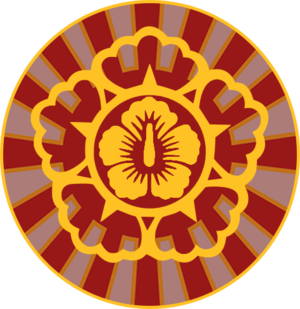Neiwufu Agency: Difference between revisions
m (Jonas windsor moved page Imperial Household (Jingdao) to Neiwufu Agency) |
|
(No difference)
| |
Latest revision as of 12:19, 30 December 2020
The Chidao Emperor Imperial Household | Imperial Stewardship Teachings of the Empire
Ministries & Secretariats: Ministry of Truth | Ministry of Purity | Ministry of Stability Chao Suweiai formerly known as National Diet Defunct:
Political Factions: Guanchang | Kantai-ha (Navy) | Gunbatsu (Army) | Shanghu (Traders) Defunct: Other institutions Tianchao Chuandui | Imperial Armed Forces | Young Wandering Society | Tegong |
The Imperial Household (the Neiwufu Agency) is an agency which is in charge of state matters concerning the Heavenly Family. It has, in more or less the same structure, existed throughout Jingdaoese history and is one of the oldest agencies, together with the Tegong.
Organization and functions
The Household is headed by the Head Steward and assisted by a vast array of servants and assistants. The Head Steward is one of the few who has direct access to the Heavenly Light and has the duty to act as His representative, ears and mouth within the Imperial compounds.
The main organization elements are:
- The Imperial Stewardship: oversees the Household.
- The Private Council: advises the Emperor on national affairs.
- The Board of the Keeper of the Heavenly Seal: the Keeper is responsible for protecting the State Seal
- The First Prince's Household: manages the daily affairs of the First Prince, who in most cases will succeed the Emperor.
- The Board of Ceremonies: coordinates with the Secretariat of Rites and handles rites within the Imperial Domains.
- The Archives and Mausolea Department: responsible for the Mausolea of the Imperial Family. The Island of Catavia (Dongdao Province) is one of its largest responsibilities.
- The Board of Works: manages the personnel.
- Board of Household Guards: handles coordination with the Kaiser Gaelen IV's Apollonian Guard, the Imperial Whites (bodyguards of the Emperor) and Tegong (secret service of the Tegong).
Overview
The needs of the Imperial Household has changed over time. The ambit of the agency's activities encompassed, for example:
- oversight of the harvesting done on the Imperial domains
- orchestrating the presentation to the Emperor of rare delicacies as gifts from his subjects
- administration of the culinary and engineering departments of the court
- regulation of to breweries
- oversight of the court ladies
- management of court servants
- oversight of the Imperial wardrobe, etc.
- attending to the imperial princes and princesses of the second to the third generation.
- regulating daily affairs of the imperial domains.
Imperial Domains
The Xianfa Constitution brought a large amount of non-Apollonian territories under the management of the Imperial Household. When the constitution was revoked, a lot of tasks remained in hands of the Household, which acted in name of the Heavenly Light.


